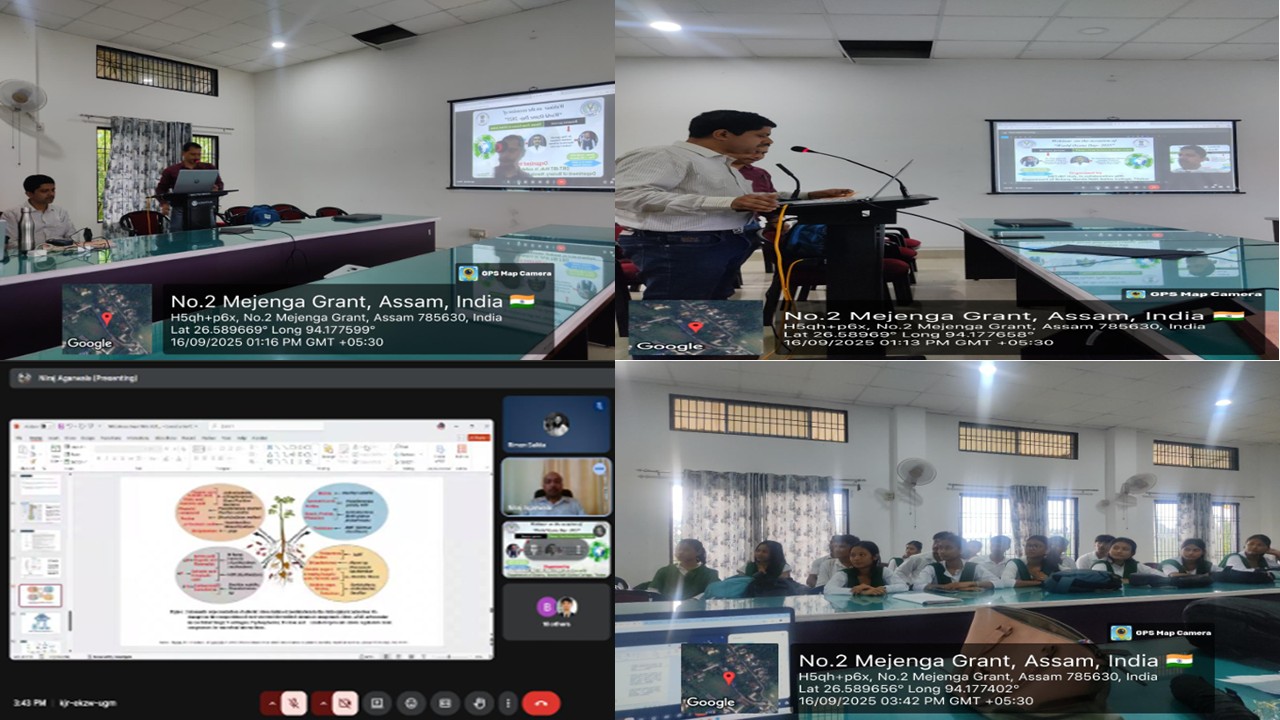Nanda Nath Saikia College celebrated the “World Ozone Day- 2025” which was organized by DBT- IBT Hub (Institutional Biotech Hub), in collaboration with the Department of Botany, Nanda Nath Saikia College, Titabar, in virtual mode. The program was held on 16th September 2025 at N. N. Saikia College itself, attended by teachers of N.N. Saikia College, students, and scholars of different institutes via Google Meet. The theme for the year 2025 was “From Science to Global Action”. The program is intended to raise awareness about environmental health issues due to the depletion of the ozone layer and promote sustainable practices for better global health by protecting the ozone layer.The report provides a summary of the Webinar on “World Ozone Day- 2025” which was organized by DBT- IBT Hub (Institutional Biotech Hub), in collaboration with the Department of Botany, Nanda Nath Saikia College, Titabar, in virtual mode. The program was held on 16th September 2025 at N. N. Saikia College itself, attended by teachers of N.N. Saikia College, students, and scholars of different institutes via Google Meet. The theme for the year 2025 was “From Science to Global Action”. The program is intended to raise awareness about environmental health issues due to the depletion of the ozone layer and promote sustainable practices for better global health by protecting the ozone layer.Objectives of the ProgramThe program's overarching aim is:To highlight the importance of united global efforts in safeguarding the ozone layer.To harness the fascinating world of plant-microbe interactions in promoting a clean and sustainable Earth.Resource persons•Dr. Niraj Agarwala, Assistant Professor, Department of Botany, Gauhati University•Dr. Balasubramanian Natesan, Associate Professor, Department of Botany, Tripura UniversitySource of Program: Google MeetThe program was started on 16/09/2025 at 01:00 P.M. with the joining of the participants on Google Meet. The program was started with an introductory session by an inaugural speech by Dr. Pranaba Nanda Bhattacharyya (Principal Investigator, DBT- IBT Hub, HOD & Assistant Professor, Department of Botany, N. N. Saikia College) on the occasion of World Ozone Day. This was followed by the welcome address by Dr. Suvangshu Dutta (Principal, N. N. Saikia College, Titabar).Session 1Session 1 was initiated at 1:20 P.M. and presided over by Dr. Juthika Dihingia (Assistant Professor, Department of Botany, N. N. Saikia College). She formally introduced the first resource person of the program, Dr. Balasubramanian Natesan, who delivered an engaging and informative lecture on the topic “The Role of Medicinal Plants in Therapeutic Properties for Human Health”. Dr. Natesan's presentation primarily focused on three main medicinalplants that are: Dodonaea viscosa, Calopogonium muconoides, and Mesosphaerum suaveolens. He elaborated on their antimicrobial properties and their potential in mitigating various pathogenic infections and human diseases. He highlighted phytochemical profiling of these plants by different characterization methods. He noted that ethanolic extracts of the studied plants demonstrated significantly higher antimicrobial activity compared to those extracted with acetone. The presentation was further enriched with research-based visual documentation, showcasing the phytochemical constituents identified in the abovementioned species. Furthermore, Dr. Natesan highlighted findings from a cytotoxic MTT assay conducted on D. viscosa, wherein extracts labeled Dv12 and Dv20 exhibited inhibitory effects on A549 human lung cancer. He also discussed the anti-biofilm potential of Dv20, specifically against pathogenic bacterial strains. After ending the presentation, the participants interacted with the resource person by asking their questions. Dr. Natesan answered all the questions very clearly. The session ended at 2:30 P.M.After session 1, all the participants had their break time around 2:30 P.M. to 2:40 P.M.Session 2:Session 2 was initiated by 2:45 P.M., led by Ms. Khaleda Begum (Assistant Professor, Department of Botany, N. N. Saikia College). She formally introduced the second resource person of the program, Dr. Niraj Agarwala, who delivered an insightful presentation on the topic, “Fascinating Dimensions of Plant Science Research”. In his presentation, Dr. Agarwala primarily emphasized the critical role of plant-microbe interactions within the rhizosphere, with particular attention to the ways in which plants perceive, retain memory, and respond to environmental stressors at both genetic and epigenetic levels. He elaborated on the influence of microbial signals in the rhizosphere, including root exudates such as phytohormones (e.g., auxins, cytokinins, gibberellins, and abscisic acid), as well as sugars, amino acids, and volatile organic compounds (VOCs). These compounds were discussed as key mediators in regulating plant growth, developmental pathways, immune responses, and stress tolerance mechanisms. He presented a visual representation of RNA-based molecular regulators, highlighting their roles in gene expression modulation under stress conditions. Dr. Agarwala also displayed the plant stress memory, recent advances in molecular and omics approaches, including the application of genetic engineering, in both plants and associated microbes, demonstrating how cutting-edge molecular tools are being utilized to enhance stress resilience in crops. To strengthen his discussion, Dr. Agarwala presented a selection of recentresearch publications relevant to these topics, thereby providing a scientific foundation for the concepts and innovations addressed in his talk. After ending the presentation, the participants interacted with the resource person by asking their questions. Dr. Agarwala answered all the questions very clearly. The session ended at 4:00 P.M.
Following the conclusion of Session 2, Dr. P. N. Bhattacharyya delivered the valedictory address at the closing segment of the webinar.The program effectively informed and engaged participants on the significance of safeguarding environmental health for both present and future generations. The event emphasized that collective efforts and increased awareness are essential for building sustainable communities and ensuring a healthier planet.By receiving innumerable positive feedback from the participants at the end of the webinar on “World Ozone Day-2025”, we can conclude that we are somewhat able to improve the power of knowledge for all the participants. We hope that all the participants have learned the countless issues related to the topics specified by the resource persons.

